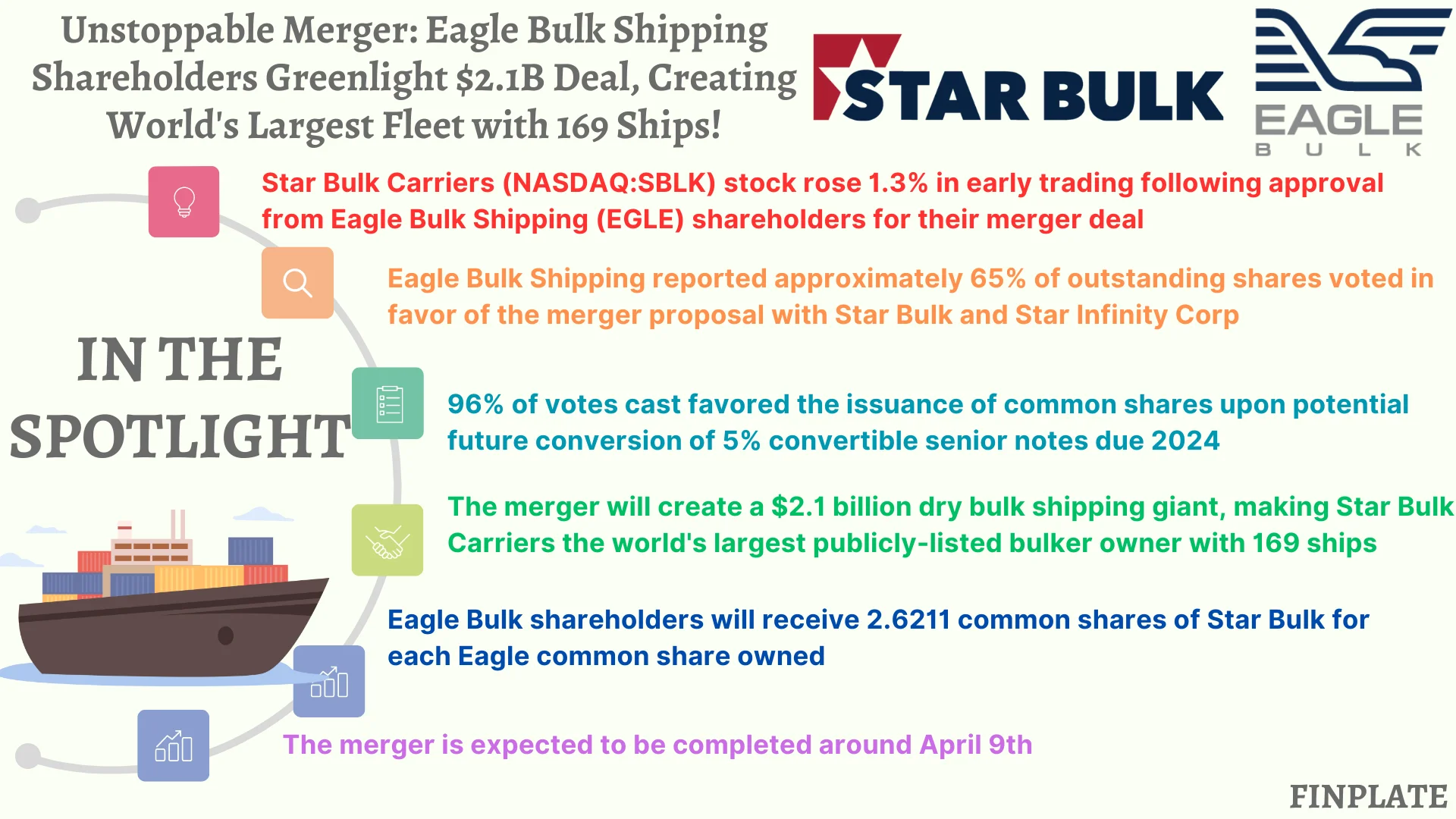
Star Bulk Carriers (listed as SBLK on the stock exchange) saw its stock price increase by 1.3% early on Friday because shareholders of Eagle Bulk Shipping (listed as EGLE) agreed to merge with them.
This merger creates a really big company in the dry bulk shipping business, worth about $2.1 billion.
Key Points:
- Approval of Merger: Shareholders of Eagle Bulk Shipping voted and agreed to merge with Star Bulk Carriers and Star Infinity Corp. About 65% of all the shares of Eagle Bulk Shipping were voted in favor of this merger.
- Favorable Vote on Share Issuance: Additionally, 96% of the votes were cast in favor of issuing common shares if the 5% convertible senior notes due in 2024 are converted into shares in the future.
- Impact on Star Bulk Carriers: After the merger, Star Bulk Carriers will become the largest publicly-listed owner of bulk carriers in the world. Their combined fleet will consist of 169 ships.
- Exchange Ratio: As part of the merger agreement, each common share of Eagle Bulk Shipping will be exchanged for 2.6211 common shares of Star Bulk Carriers.
- Expected Completion Date: The companies anticipate completing the merger around April 9th.
This merger is significant because it consolidates two major players in the dry bulk shipping industry, making the newly formed Star Bulk Carriers an even more dominant force in the market. It’s also worth noting that mergers like these can have various implications for both the companies involved and the industry as a whole, including potential changes in market dynamics, competitive landscape, and shareholder value.

About Star Bulk Carriers
Star Bulk is a renowned international shipping firm offering top-notch transportation services for dry bulk goods. With a fleet of 122 modern vessels crafted in leading shipyards worldwide, boasting an average age of approximately 10.5 years, we ensure efficient delivery on a global scale. Our fleet spans various vessel types, from Supramax to Newcastlemax, with a combined capacity of around 13.4 million deadweight tons (DWT).
We specialize in transporting both major bulk commodities like iron ore, minerals, and grain, as well as minor bulk items such as bauxite, fertilizers, and steel products. Annually, we handle over 70 million metric tons of cargo, prioritizing safety, efficiency, and environmental stewardship. Notably, Star Bulk ranks among the top performers in global shipping risk assessments by Rightship.
Established in the Marshall Islands on December 13, 2006, Star Bulk operates executive offices in Athens, Greece, and Limassol, Cyprus. Our common stock is publicly traded on the Nasdaq Global Select Market under the ticker symbol “SBLK.”
Furthermore, we own Star Bulk (Singapore) Pte. Ltd., headquartered in Singapore, which facilitates the seamless transportation of dry bulk commodities from point of origin to destination, catering to end-user needs.
About Eagle Bulk Shipping

Eagle Bulk Shipping Inc. (NYSE: EGLE), a US-based company, is fully involved in owning and operating ships for the global transportation of drybulk goods.
Based in Stamford, Connecticut, with additional offices in Singapore and Copenhagen, Eagle specializes in the mid-size drybulk vessel sector and possesses one of the largest fleets of Supramax/Ultramax ships globally. The company handles all aspects of management, such as strategic planning, commercial operations, technical maintenance, and administrative tasks.
Supramax/Ultramax vessels are highly versatile in the drybulk shipping realm due to their size and specifications. Ranging from 50 to 65 thousand metric tons in deadweight (DWT) and approximately 200 meters in length, these vessels can accommodate substantial cargo volumes and access a vast majority of ports worldwide. Furthermore, equipped with onboard cranes and grabs, Eagle’s ships can load and unload cargo without relying on port infrastructure.
Eagle serves a diverse clientele, including miners, producers, traders, and end users, offering transportation solutions for a wide range of cargo types. These include major bulk commodities like coal, grain, and iron ore, as well as minor bulk items such as fertilizer, steel products, petcoke, cement, and forest products.
Summary





